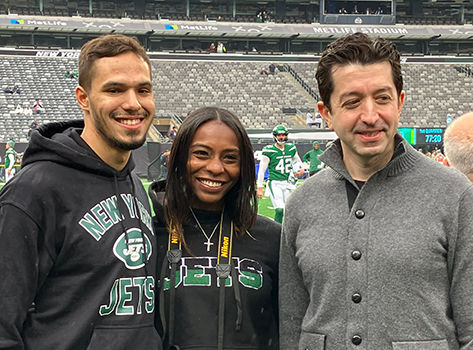
Emergency room visits had become common for 27-year-old Kenneth B. of Clifton, New Jersey. A former college track athlete in his last year of physical therapy school, Kenneth couldn’t have expected he would be in and out of the ER with heart problems regularly.
It Started with an Irregular Heartbeat
Kenneth experienced his first major scare at 23 years old while training for a run. “I noticed my heart was beating too rapidly,” he says. “It was out of control at 180 beats per minute and felt like it was falling out of my chest. I passed out and, when I awoke, an ambulance was arriving. Someone had seen me collapse and called 911.”
Genetic Testing and Treatment
During that hospital stay, doctors shocked Kenneth’s heart back into normal rhythm. They also found the cause of his heart condition — a rare genetic mutation called non-compaction cardiomyopathy, which prevented his heart from fully developing at birth. This meant Kenneth’s heart was severely compromised and, as he aged, it put him at risk for developing early onset congestive heart failure and sudden cardiac death.
Kenneth worked with a heart failure specialist for the next few years. Cardioversion corrected his atrial fibrillation (Afib) irregularities. A surgically implanted defibrillator was on standby to shock his heart into rhythm if it failed. He was also on intense medications and cardiac rehabilitation program to keep his native heart as healthy as possible.
Heart Failure Concerns Continue to Mount
Despite all these interventions, Kenneth’s heart became weaker, hospital visits became more frequent, and it was evident his heart was failing. Kenneth paused his education and moved home to New Jersey for family support. He also got a job at Morristown Medical Center in food services. One day while at work, Kenneth recalls feeling chest pain that became too intense to handle.
Kenneth called his primary care doctor who believed his symptoms indicated acute heart failure. When Kenneth arrived at the emergency department, he was immediately admitted into the Cardiac Intensive Care Unit.
A Heart Failure Specialist Takes Charge
Kenneth’s echocardiogram showed his heart’s pumping function had deteriorated to less than 5%. Amirali Masoumi, MD, director of the Cardiogenic Shock Program, and his multidisciplinary team, delivered swift and collaborative care to support Kenneth’s heart.
“We surgically implanted a lifesaving device that we like to call a bridge, while Kenneth was being evaluated to see if he was a candidate for heart transplantation,” says Dr. Masoumi. “A temporary heart pump is a mechanical pump for patients with end-stage heart failure. For some, it can restore a failing heart, but for Kenneth, it could only buy time. Kenneth’s native heart was not salvageable.”
The Transfer to NYU Langone Health
Morristown Medical Center and New York University (NYU) collaborate to expedite transplant care for eligible patients. Within one week of his admission to Morristown, Kenneth was transferred to NYU and listed for a heart transplantation. Just a few weeks after the transplant, the NYU hospital hallway erupted with applause for Kenneth’s discharge. He was 20 pounds lighter with lots of work ahead to regain strength and prevent his body from rejecting the new heart. But he was alive.
“Movement was really painful early on,” says Kenneth, “but I immediately felt the difference of a working heart versus a dying heart.”
A Renewal of Life
Although Kenneth wishes he knew more about his generous donor, doctors tell him it’s still too early to meet the family. He remains under the care of NYU Langone Health, but soon, as part of the collaboration between the hospitals, he will resume heart care at Morristown Medical Center with the Heart Success and heart failure team.
With a new lease on life, Kenneth hasn’t wasted any time. He married his longtime fiancée Shannon and got a job as a physical therapy aide while studying for the physical therapist assistant (PTA) exam to obtain his licensure.
“Every day is a blessing,” says Kenneth. “My faith really helped me through, and I am incredibly grateful to so many, for so much. Now I just want to live a life of service to show the gratitude I feel for this second chance I’ve been given.”
Know Your Risk for Heart Disease in 2 Minutes
Take the Quiz
Be Proactive About Your Health
To stay safe and healthy, it's good to have a primary care provider who knows and understands your health history and wellness goals.